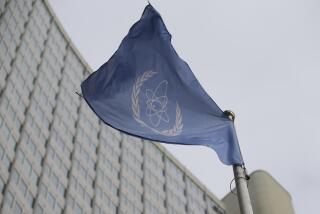Iran warns on U.N. sanctions
- Share via
TEHRAN — Iranian officials said Sunday that any further United Nations Security Council sanctions on the country could jeopardize its recent decisions to grant international inspectors greater access to nuclear sites and disclose information about past activities.
Iran last week announced a decision to allow inspectors from the International Atomic Energy Agency, the U.N.’s nuclear watchdog, to monitor its heavy-water reactor near the western town of Arak, after having barred them this year. Iran also agreed on increased safeguards for its uranium enrichment facility near the town of Natanz and to further discuss unresolved questions about its nuclear research.
But Iranian officials on Sunday said bluntly that Iran’s acquiescence to IAEA requests was meant to stave off further U.N. action over its controversial enrichment of uranium, which it has repeatedly stated it will not halt.
“This move was in line with Iran’s intention to strengthen the International Atomic Energy Agency’s role in the international arena as the organization which was related to Iran’s nuclear program, and to weaken the movement which was taken via the U.N. Security Council against Iran’s peaceful nuclear intentions,” Iran’s representative to the IAEA, Ali Asghar Soltanieh, told the Iranian Students News Agency.
The Iranian statements came a day after IAEA inspectors arrived in North Korea to begin monitoring that nation’s nuclear complex, which had been shut to international monitors in recent years. North Korea on Saturday told U.S. officials it had shut down its nuclear reactor, an important move toward scaling back its controversial nuclear program.
“It appears that the facility is shut down,” national security advisor Stephen Hadley said during an interview on “Fox News Sunday.”
But the Bush administration continues to have “concerns they may have a covert enrichment program,” he said. “That will be the next subject of discussions.”
Iran, meanwhile, remains locked in a dispute with the U.S. and other members of the international community over its nuclear energy projects, which governments in the U.S. and Europe suspect mask a weapons program. Tehran insists such weapons run counter to Iran’s Islamic principles and that it is obtaining nuclear technology only to meet its growing energy needs and conduct scientific research.
The Security Council, prodded by the U.S., has demanded that Iran stop producing concentrated uranium, a building block for a civilian nuclear energy program, but which can also be used to manufacture an atomic bomb. It has imposed two rounds of economic sanctions on Iran and is gearing up for a third.
But Soltanieh warned that any new move by the Security Council could “poison the current atmosphere” between Iran and the atomic agency.
A third set of sanctions could also end Iran’s decision to begin talks meant to clear up questions about its nuclear activities, Iranian Foreign Ministry spokesman Mohammed Ali Hosseini told reporters at his weekly briefing in Tehran.
Regardless of the outcome of the IAEA talks, Iran will continue enriching uranium, he said.
“The enrichment of uranium is being carried out according to predetermined plan and has nothing to do the process of negotiations with IAEA,” he said, rejecting inspectors’ recent assessment that Iran had slowed down its enrichment activities.
--
Special correspondent Mostaghim reported from Tehran and Times staff writer Daragahi from Cairo.
More to Read
Sign up for Essential California
The most important California stories and recommendations in your inbox every morning.
You may occasionally receive promotional content from the Los Angeles Times.










